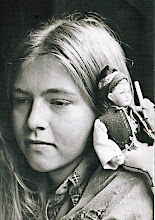Here's a closer view of the trams.
The card was sent to Master Alexander Seavey of Eugene, Oregon in 1910. Little Alexander would have been just over two years old at the time. He was born into an Oregon family with pioneer roots. His father, James Walter, was a hops farmer who married Bessie Kelly. Bessie's father John came from Dublin, Ireland, so the aunt who wrote this card may have been a relative of his.
The message is very sweet:
Belfast Ireland
April 5 -1910
My Dear little Boy -
Tell Mamma that Aunt Trey (Tray?) got her letter yesterday and will write her next Sunday. I was so glad to hear all the nice things about you and so happy to hear in her other letter that you could say my name - Don't forget it, please - It is just four months today since I saw you last. I stole upstairs and you were asleep in your little bed. How do you like the looks of these two-story cars? Not so much as your own new "chu-chu" car I know. Wish you bring it over to take me riding. Kiss Mamma, Papa, Aunt Kate, Elizabeth, W___, Aunt Ida for me, and tell everyone to compliment you.
Lots of love from Aunt Trey




























